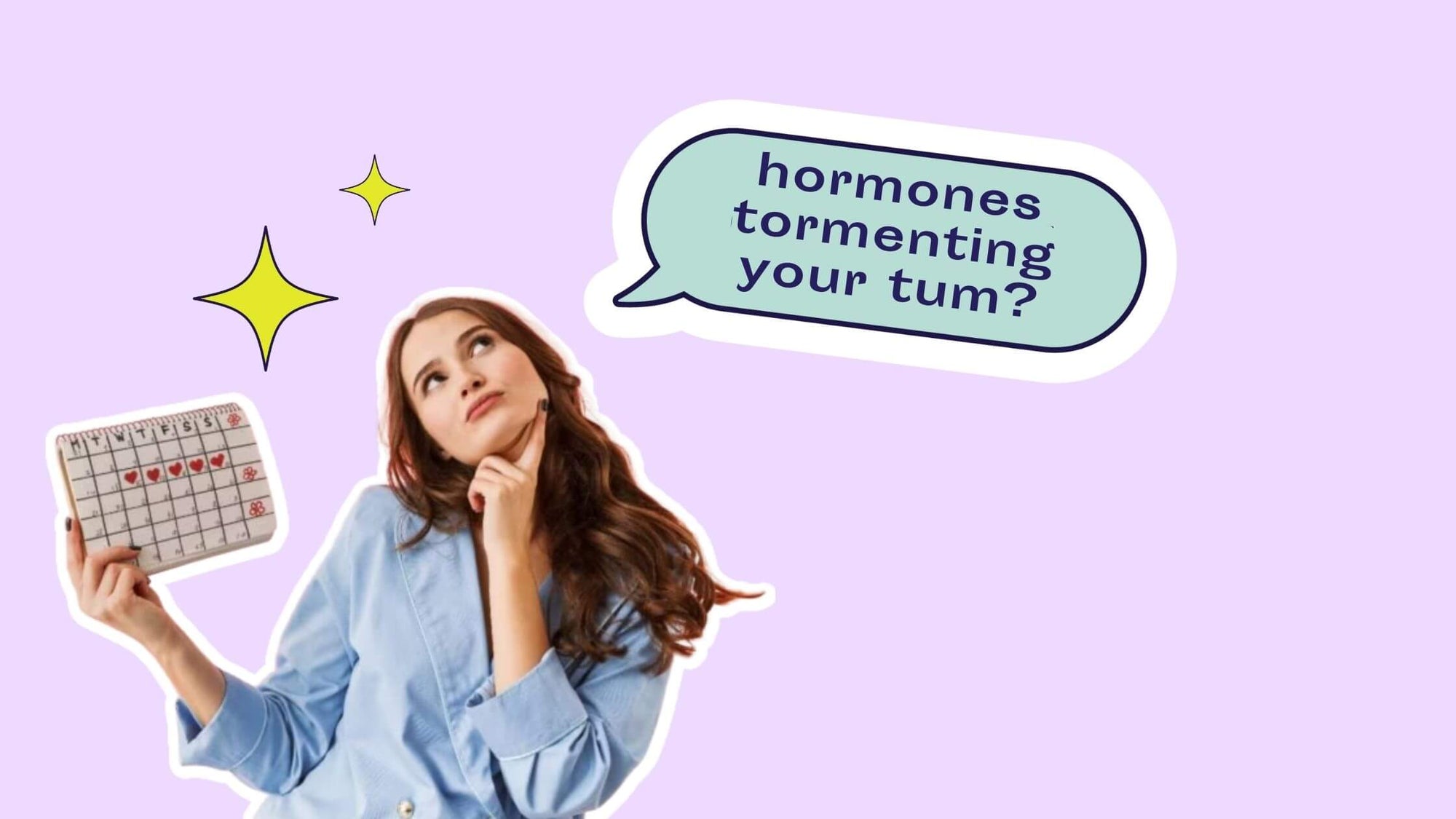How Do I Know If I'm Bloated?
When you’re dealing with chronic bloating, it can lower your quality of life and disrupt your activities of daily living. It can also be a sign that something more sinister is going on inside your body.
Bloating is a common and often uncomfortable symptom associated with a range of digestive issues, including irritable bowel syndrome (IBS), inflammatory bowel disease (IBD), small intestinal bacterial overgrowth (SIBO), and Crohn’s disease. It’s only mild in some, but in others, bloating can be severe and frequent.
Understanding the signs and symptoms of bloating can help you identify whether your discomfort is simply a passing occurrence or a more significant concern. When you can identify whether you’re bloated or something else is going on, you’ll be better able to take positive steps towards resolving any related health issues.
This article will explore the various indicators that can help you recognise if you're bloated along with other digestive symptoms, such as gas and abdominal cramps as well as the beneficial lifestyle changes and natural remedies that you can take to minimise bloating.
What Is Bloating?
Bloating is a digestive symptom that is characterised by a feeling of fullness, tightness, or swelling in the lower abdomen. It's usually accompanied by other symptoms, such as gas and fatigue when caused by an underlying health issue. It can result from a wide range of things, including both physical and psychological factors.
Although difficult to distinguish between the two, bloating and abdominal weight gain are completely different things. The former is temporary, and the latter is permanent (unless you take action to lose weight). However, because they both lead to the same feeling of fullness around the lower abdomen, it can be tough to distinguish between them.
What Causes Bloating?
Bloating is ultimately caused by an increase in gas in the gut or water retention (which increases during the reproductive cycle in women). Fluid balance can also be disrupted by dehydration, illness, infection, and poor diet.
But knowing the exact cause of your bloating isn’t as easy as it sounds. It could be any of these factors or even a combination of several of them. Central weight gain could also be mistaken for chronic bloating, which adds another layer of complexity to this.
Let’s take a closer look at the main causes of bloating.
1. Eating too much
When a large volume of food enters your stomach and small intestines at once, it’s going to cause expansion of the digestive tract. As a result, you’ll feel more bloated, but this should only be temporary and will subside once your digestive tract has digested and absorbed the food you’ve eaten.
2. Eating too quickly
Sometimes, something as simple as eating too quickly can lead to bloating. When you eat your dinner too quickly, it causes you to swallow lots of air.
This air has to go somewhere, and that place is your digestive tract! Excess air in the digestive tract will lead to gassiness and bloating. Again, this should only be temporary until the food in your GI tract has been metabolise and absorbed.
3. Changes in hormones
In women, the reproductive cycle is often a cause of bloating. In the days following ovulation and leading up to your period, you might start to feel more bloated and puffier. This is all thanks to changes in oestrogen and progesterone, which impact water retention.
Similarly, the drastic hormonal changes that occur in early pregnancy can cause severe bloating. In fact, it’s one of the tell-tale symptoms that women experience before they have even confirmed a pregnancy.
4. Eating gassy foods
Certain foods produce more gas than others in the digestive tract. Eating a high volume of gas-producing foods is an almost guaranteed way to feel bloated and gassy.
Gas-producing foods include fatty or salty foods, beans and legumes, onions, garlic, and cruciferous vegetables. Consuming these foods can quickly cause bloating and discomfort in the lower abdomen as you gut bugs ferment them and release gas into your colon.
5. Taking regular medications
Certain medications can increase water retention in the body, which increases the severity and frequency of bloating. These medications include anti-diuretics, antidepressants, anti-epileptics, and non-steroidal anti-inflammatory drugs (NSAIDs).
6. Pre-existing medical conditions
Bloating is a common denominator in hundreds of medical conditions that impact all areas of the body. Digestive disorders, such as irritable bowel syndrome, inflammatory bowel disease, and gastroesophageal reflux disorder, are almost always associated with moderate to severe bloating.
Additional chronic health conditions that can cause ongoing bloating troubles include eating disorders, infections, and metabolic disorders.
What Does Bloating Feel Like?
Bloating causes feelings of fullness or tightness in the abdomen. It’s usually accompanied by slight pains or cramps and distension of the lower belly area.
Although everybody experiences bloating differently, it can often feel like:
- Abdominal distension or swelling
- A feeling of heaviness in the abdomen
- Excessive gas, leading to increased belching or flatulence
- Gurgling sounds and the feeling of movement in the stomach or intestines
How To Relieve Bloating
We’ve answered the question, ‘What is bloating?’ and we’ve covered what causes it and what it feels like to experience bloating. Now let’s take a look at how to reduce bloating and digestive discomfort.
1. Eat more slowly and practice mindful eating
When you slow down the rate at which you’re eating your meals and snacks, you will be able to properly chew your food into small pieces before it enters your lower gastrointestinal tract. This will speed up the digestion process and minimise the risk of bloating. Eating more slowly also reduces the amount of excess air you swallow, further reducing bloating.
The digestive process begins with your eyes! When your sole focus is on the meal in front of you, your digestion will improve because your mouth will begin to produce saliva before any food has even entered your mouth. Therefore, when you eventually start eating, chemical and mechanical digestion can begin efficiently in the mouth, and you won’t experience severe digestive issues.
Mindful eating involves chewing your food more slowly to savour every bite. It encourages a heightened awareness of physical sensations, thoughts, and emotions related to eating.
The practice of mindful eating emphasises the importance of being conscious of the entire eating process, including food selection, preparation, and consumption. To practice mindful eating, focus on your food and avoid distractions, such as the TV or your phone.
2. Reduce your consumption of gas-producing foods
Bloating is normal when you eat a large meal full of gassy foods. For quick and effective gas relief, reduce your consumption of gas-producing foods. This might mean making significant changes to your diet, but it may be necessary if you want to eliminate bloating.
Gas-producing foods include onions, garlic, cruciferous vegetables, beans, peas, and legumes. You will also need to reduce your consumption of gassy drinks, such as energy drinks, sodas, and fruit juices.
3. Increase your fibre intake
Consuming enough dietary fibre is essential for preventing constipation and bloating. However, many people don’t achieve the recommended dietary fibre intake of between 25 and 38 grams a day.
Make sure to include plenty of fibre-rich foods in your diet, including whole grains, fruits, and vegetables, to fuel your beneficial gut jugs and aid digestion. However, try to avoid overconsuming fibre, as this can have the opposite effect and cause worsening digestive symptoms. Ideally, you should try and stick to less than 70 grams of fibre a day.
4. Avoid chewing gum
Chewing gum increases the amount of air entering your digestive tract. Avoiding chewing gum could, therefore, help you to tackle chronic bloating and gas. Consider using peppermints to freshen your breath instead of chewing gum all day.
5. Keep a food diary
Keeping a detailed food diary that includes the different meals and snacks you’re eating, when you’re eating them (date and time), and any digestive symptoms that you’re experiencing afterwards is helpful to identify trigger foods that worsen your bloating.
You can look back at your food diary at the end of each week and identify patterns and associations between food types and digestive issues. This will help you to identify potential culprits so you can work to eliminate them from your diet.
You should also keep track of your fluid intake, as certain drinks or dehydration can both result in increased bloating and digestive discomfort.
If you’re unsure how to analyse your food diary, consider working with a professional dietician or nutritionist. They will be able to take a look at your food intake and offer beneficial adjustments to relieve your symptoms.
6. Change medications
If you suspect that your medications are causing you to feel bloated, you might benefit from changing them. Sometimes, switching to a similar medication can eliminate certain side effects, including bloating and abdominal discomfort.
This is something that your doctor can advise you with, and you should never make changes to your medications without the support and guidance of a qualified healthcare professional.
7. Manage existing health conditions
Poor management of digestive disorders, infections, and metabolic disorders like diabetes, can exacerbate digestive issues. For this reason, it’s essential to manage any chronic medical conditions effectively if you want to eliminate bloating and gas.
Depending on your condition, the optimal management plan will differ. However, you can work with your doctor or another licensed healthcare professional to figure out the best course of action for your needs.
8. Take a probiotic and digestive enzyme supplement
Probiotics are live bacteria that are known to be beneficial for digestion. They include species like Lactobacillus, Bifidobacterium, and Enterococcus, and they reside in their millions inside the colon.
Although you already have millions of helpful bacteria in your digestive tract, it does no harm to give them a helping hand by taking a probiotic supplement. A probiotic supplement boosts your digestion and reduces bloating, gas, and abdominal cramps.
Make sure any probiotic supplement you take contains at least one billion live bacteria. Digestive enzymes are another great supplement to take. Whether you choose to take a supplement that contains both probiotics and digestive enzymes together, or you choose to have them separately, digestive enzymes are great for improving GI symptoms.
As with probiotic bacteria, digestive enzymes are found naturally in the body. They are produced in various areas of your gastrointestinal tract to break down food into smaller particles that can be absorbed into your bloodstream and used by your body for energy.
Taking a digestive enzyme supplement can speed up your digestive processes and reduce the risk of bloating and abdominal distension.
9. Go for a walk outside after meals
Light movement can be one of the most effective natural remedies for bloating. Getting your body moving can increase blood flow to the digestive tract and aid digestion.
Take a short walk outside after eating each meal to support your digestion, get some fresh air, and expose your skin to sunlight. Walking outdoors enables you to gain the additional benefits of being in nature and increased vitamin D synthesis.
10. Take a warm bath
Although a short-term solution to bloating, taking a bath can be a great way to relieve abdominal discomfort. It doesn’t address the underlying causes of your bloating, so you might still need to take further action. However, it provides some relief when you’re in pain or feel swollen due to having a bloated belly.









